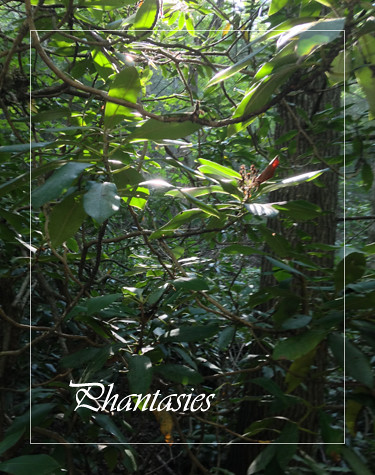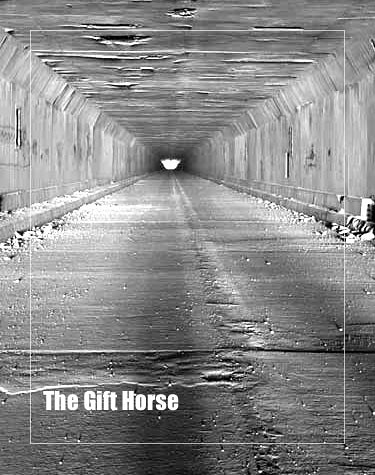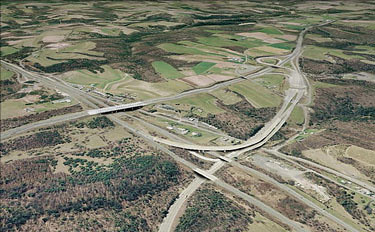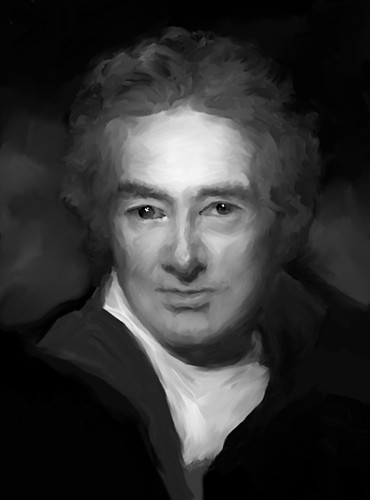
Volume XII, Issue XIV
Phantasies
By George MacDonald, Chapter 8
I am a part of the part, which at first was the whole."
~ Mephistopheles in Johann Wolfgang von Goethe's Faust.
My spirits rose as I went deeper; into the forest; but I could not regain my former elasticity of mind. I found cheerfulness to be like life itself--not to be created by any argument. Afterwards I learned, that the best way to manage some kinds of pain fill thoughts, is to dare them to do their worst; to let them lie and gnaw at your heart till they are tired; and you find you still have a residue of life they cannot kill. So, better and worse, I went on, till I came to a little clearing in the forest. In the middle of this clearing stood a long, low hut, built with one end against a single tall cypress, which rose like a spire to the building. A vague misgiving crossed my mind when I saw it; but I must needs go closer, and look through a little half-open door, near the opposite end from the cypress. Window I saw none. On peeping in, and looking towards the further end, I saw a lamp burning, with a dim, reddish flame, and the head of a woman, bent downwards, as if reading by its light. I could see nothing more for a few moments. At length, as my eyes got used to the dimness of the place, I saw that the part of the rude building near me was used for household purposes; for several rough utensils lay here and there, and a bed stood in the corner.
An irresistible attraction caused me to enter. The woman never raised her face, the upper part of which alone I could see distinctly; but, as soon as I stepped within the threshold, she began to read aloud, in a low and not altogether unpleasing voice, from an ancient little volume which she held open with one hand on the table upon which stood the lamp. What she read was something like this:
So, then, as darkness had no beginning, neither will it ever have an end. So, then, is it eternal. The negation of aught else, is its affirmation. Where the light cannot come, there abideth the darkness. The light doth but hollow a mine out of the infinite extension of the darkness. And ever upon the steps of the light treadeth the darkness; yea, springeth in fountains and wells amidst it, from the secret channels of its mighty sea. Truly, man is but a passing flame, moving unquietly amid the surrounding rest of night; without which he yet could not be, and whereof he is in part compounded."
As I drew nearer, and she read on, she moved a little to turn a leaf of the dark old volume, and I saw that her face was sallow and slightly forbidding. Her forehead was high, and her black eyes repressedly quiet. But she took no notice of me. This end of the cottage, if cottage it could be called, was destitute of furniture, except the table with the lamp, and the chair on which the woman sat. In one corner was a door, apparently of a cupboard in the wall, but which might lead to a room beyond. Still the irresistible desire which had made me enter the building urged me: I must open that door, and see what was beyond it. I approached, and laid my hand on the rude latch. Then the woman spoke, but without lifting her head or looking at me: "You had better not open that door." This was uttered quite quietly; and she went on with her reading, partly in silence, partly aloud; but both modes seemed equally intended for herself alone. The prohibition, however, only increased my desire to see; and as she took no further notice, I gently opened the door to its full width, and looked in. At first, I saw nothing worthy of attention. It seemed a common closet, with shelves on each hand, on which stood various little necessaries for the humble uses of a cottage. In one corner stood one or two brooms, in another a hatchet and other common tools; showing that it was in use every hour of the day for household purposes. But, as I looked, I saw that there were no shelves at the back, and that an empty space went in further; its termination appearing to be a faintly glimmering wall or curtain, somewhat less, however, than the width and height of the doorway where I stood. But, as I continued looking, for a few seconds, towards this faintly luminous limit, my eyes came into true relation with their object. All at once, with such a shiver as when one is suddenly conscious of the presence of another in a room where he has, for hours, considered himself alone, I saw that the seemingly luminous extremity was a sky, as of night, beheld through the long perspective of a narrow, dark passage, through what, or built of what, I could not tell. As I gazed, I clearly discerned two or three stars glimmering faintly in the distant blue. But, suddenly, and as if it had been running fast from a far distance for this very point, and had turned the corner without abating its swiftness, a dark figure sped into and along the passage from the blue opening at the remote end. I started back and shuddered, but kept looking, for I could not help it. On and on it came, with a speedy approach but delayed arrival; till, at last, through the many gradations of approach, it seemed to come within the sphere of myself, rushed up to me, and passed me into the cottage. All I could tell of its appearance was, that it seemed to be a dark human figure. Its motion was entirely noiseless, and might be called a gliding, were it not that it appeared that of a runner, but with ghostly feet. I had moved back yet a little to let him pass me, and looked round after him instantly. I could not see him.
Where is he?" I said, in some alarm, to the woman, who still sat reading.
There, on the floor, behind you," she said, pointing with her arm half-outstretched, but not lifting her eyes. I turned and looked, but saw nothing. Then with a feeling that there was yet something behind me, I looked round over my shoulder; and there, on the ground, lay a black shadow, the size of a man. It was so dark, that I could see it in the dim light of the lamp, which shone full upon it, apparently without thinning at all the intensity of its hue.
I told you," said the woman, "you had better not look into that closet."
What is it?" I said, with a growing sense of horror.
It is only your shadow that has found you," she replied. Everybody's shadow is ranging up and down looking for him. I believe you call it by a different name in your world: yours has found you, as every person's is almost certain to do who looks into that closet, especially after meeting one in the forest, whom I dare say you have met."
Here, for the first time, she lifted her head, and looked full at me: her mouth was full of long, white, shining teeth; and I knew that I was in the house of the ogre. I could not speak, but turned and left the house, with the shadow at my heels. "A nice sort of valet to have," I said to myself bitterly, as I stepped into the sunshine, and, looking over my shoulder, saw that it lay yet blacker in the full blaze of the sunlight. Indeed, only when I stood between it and the sun, was the blackness at all diminished. I was so bewildered--stunned--both by the event itself and its suddenness, that I could not at all realise to myself what it would be to have such a constant and strange attendance; but with a dim conviction that my present dislike would soon grow to loathing, I took my dreary way through the wood.
(to be continued)






Peach Blossoms, Crozet, Virginia. Photos by Bob Kirchman
Building the Tallest Bridge in the World
The Millau Viaduct crossing the Tarn River Valley in Southern France is an amazing work of engineering and construction.

The Gift Horse
Short Story by Bob Kirchman
If there was anything that bothered Rupert Zimmerman, the driving force behind building the Bering Strait Bridge, it was 'impossibility' created solely by bureaucratic convolutions. When the family packed in the car during his youth to visit the extended family in Michigan, they were inevitably faced with the Breezewood Interchange on Interstate Seventy. On Summer road trips the mighty highway's brief diversion to the old Lincoln highway resulted in gargantuan traffic jams, boiling radiators and often as many boiling tempers. Zimmerman's father REFUSED to stop at the roadside businesses who's continual lobbying fended off many a reasonable attempt to build the connection.
The lack of a connection was originally a byproduct of the funding legislation that allowed the Interstate highways to be built. Highways without tolls received the 90% Federal funding and tolls were permitted in special circumstances if they were needed to retire the bonds the state issued to build the road, but the Pennsylvania Turnpike had been built depending on the toll revenue and the Turnpike Authority was going to use ongoing tolls to support operations and maintenance of the facility. Interstate Seventy from Maryland to the Turnpike had been built by using the standard funding formula but Federal funds for the connection to the turnpike would only be given if the Turnpike became a freeway atfer the bonds were retired.
Penndot would not commit the entire amount of funding to complete the interchange, so it languished as a grade intersection onto US Thirty for decades. Service businesses rose and fell, but all considered the 'permenant' detour of Interstate Seventy crucial to their continued viability. The Turnpike Authority relocated the road around the Sideling Hill Tunnel, which they abandoned. This created a rather awkward interchange where you crossed the road you WANTED to be on by an overpass on your way to US 30 where you would double back to take the road further.
The whole scenario seemed to be taken from the age of competing railroads in the Nineteenth Century where rival roads spurned each other at what engineers would consider logical connecting points. As Rupert Zimmerman connected continents in the later part of the Twenty-first Century, the roads in Breezewood remained separated. Indeed, one would have laughed at the notion that they EVER would be connected.
But now the continents were connected. Indeed it had taken some hard negotiations and the infusion of Zimmerman money to connect Hokkaido, Japan's Northernmost Island, to the Asian mainland. The Completion of the Pan-American Highway through guerilla infested Central America was a similar challenge. Elizabeth Zimmerman O'Malley became known for her skills as a negotiator as the world was brought together. As the Zimmerman clan cut the ribbon for the new Americas Connector and rode through the tunnel under the now somewhat antiquated Panama Canal, it seemed that there was no obstacle too great, no river too wide, no mountain to high... but then there was Breezewood!
Indeed, the task of joining continents and its successful completion left Rupert Zimmerman with time on his hands. In his complex at Wales, scores of young apprentices peered into computer screens seeking to smooth the world's traffic flow. Zimmerman silently chuckled at the thought, passed along to him that you were really old when your colleagues were young enough to be your children. "Hah!," the old man thought as he walked past the office of his granddaughter, who was running the great bridge's operation now. Rupert's mind wandered to the time when his little daughter Elizabeth sat at a little table beside his drawing ponies and princesses.
Working with young people kept you young. That was what Zimmerman's experience told him anyway. For centuries father and mother had taught the skills of life to their children, who in turn taught their children. In relatively modern times the task had been relegated to 'experts' residing in the great universities. Sadly, much of the world's distress could be traced to ideas such as Marxism that flourished in the halls of academia long after they had failed as actual methods of governance. Zimmerman's young friends, the Greenes were pioneering a new interaction of academy connected to the world; one that did not isolate itself in ivory towers.
But as Zimmerman walked through the 'Labyrinth of Exile,' as he called his complex at Wales, the thought washed over him that he really was unnecessary now. He walked to the stairs and proceeded to the roof of the complex's tallest tower. He thought of the Patriarch David, Israel's great warrior-king. His undoing had begun on a rooftop. Rupert needed to stay out of his daughter's way... and now he needed to stay out of the way of his granddaughter, but firmly convinced that: "The devil find's work for idle hands," that thought propelled his hasty retreat from the rooftop. He stopped at the office of a young engineer and asked him to pull up some map images. He was not at all surprised by the top entry that came up in unfinished highway connections. It had remained so for decades. Rupert Zimmerman set is mind on Breezewood!
*******
His reception in Panama had been far warmer, Zimmerman thought, than the one he received in Harrisburg, Pennsylvania. After several days of being pushed around through various offices of Penndot, Zimmerman had an audience with the Governor. Presenting her with a complete proposal of what Zimmerman Bridge and Highway would reconstruct the interchange for, he then handed her a cheque for the entire amount plus twenty per-cent for the inevitable overruns. The funds were clearly designated and the contract printed on the back of the cheque made it impossible for the funds to be diverted without a substantial penalty.
For years, a cartel of Breezewood businesses had successfully thwarted any effort to close the gap. Now they created a charge that Zimmerman was redistributing his own funds to line his own pockets! Even as the old man set up a trust to pay for 'substantial decreases in hospitality revenue,' Breezewood's lawyers lined their own pockets creating even more trumped-up charges to stall the project. Zimmerman rented a suite in one of Breezewood's hotels and made a show of having his breakfast at Perkin's or any number of Breezewood establishments. Though the old man graciously lobbied for his proposal, the local anger only intensified. There was an assassination attempt. After a bullet lodged in the wall of the pancake house behind the great builder, Pat and Elizabeth begged him to come home.
Panama and Nicaragua had been a breeze, compared to Breezewood," the old man thought. But after the assassination attempt, Penndot quickly and quietly awarded the contract for the Beezewood Connection to J. D. Eckman in Atglen, Pennsylvania. Slowly, the planning and construction began. Zimmerman admired the work of Eckman bescause they had pioneered some bridge jacking techniques. In decades past, the bridge carrying interstate 295 across the Christina River in Wilmington, Delaware had sunk on its pilings because of improperly stored sand piles at its pilings. Eckman brought in an innovative jacking system allowing the compromised pilings to be rebuilt. The bridge remained open even as its supporting structure was completely replaced.
Now the firm installed a prefabricated flyover to connect the interchange on the old section of turnpike to Interstate Seventy. Prefabrication was necessary because the 'cartel' had lobbied into place a set of 'environmental' regulations that made on-site construction impossible. Six months after permits were finally pulled, drivers sped from the interstate onto the turnpike. In the months that followed, Zimmerman's accountants held their breath, expecting a slew of lost revenue claims on the trust fund. As it turned out, Breezewood revenues actually increased. The few attempts to 'prove' otherwise and tap the fund were pretty quickly found out and prosecuted.
Zimmerman himself did not attend the opening ceremonies. He was to those outside of his circle of family and friends, seen as quite a recluse now, though his children and grandchildren would beg to differ. He DID drive through the connector, months later, in a Toyota. Three generations of Zimmerman family rode with him in the car as they drove from Virginia to Michigan.

The rebuilt Breezewood Interchange.
Copyright © 2016, The Kirchman Studio, all rights reserved

Public Service as a Holy Calling
The Life of William Wilberforce
No one, however, has the right to do nothing. We all have a great eternal work that we are called to accomplish; eternity demands that we use this short and precarious life as well as we can. But aside from that, in a world as needy as ours, surely health and leisure and financial wealth should be able to find some ignorance to instruct, some wrong to redress, some want to supply, some misery to alleviate. Won’t ambition and greed ever go to sleep in our hearts? Will we ever run out of things to want? We are so quick to discover new things to desire, so eager to pursue them; why can’t we be as hungry to find use in our lives for a Christlike spirit of love?” – William Wilberforce
I recommend that the great, the wise, the learned, and the successful… make a habit of considering their superiority, whether it is derived from nature, study, or fortune, as an undeserved gift from God. This reflection will naturally tend to create a humbler disposition, one that is more useful to God and humanity, rather than the proud self-complacency such people usually tend to feel. If they turn their hearts to God, they will find themselves filled with great reverence, humility, and gratitude, delighting to be engaged in God’s praises and work. When we realize how much we have been given, we long to be employed in the loving service of this universal Gift-Giver.” – William Wilberforce
Lon Fendall’s book: To Live Free, William Wilberforce, Experiencing the Man, the Mission, and the Legacy is a great short introduction to the life of this important reformer. Most known for abolishing the British slave trade, Wilberforce labored hard in many areas to make his countrymen more humane, more upright and more honoring to the Kingdom of God. But he began life as an unlikely candidate for historical greatness. The son of a wealthy merchant, he was born August 24, 1759. His family’s wealth would have provided for him to life the life of the idle rich but early in his life, he tasted something better. As a youth in school he had heard the preaching of John Newton. He was drawn to relatives who were what were called ‘Enthusiasts,’ followers of John Wesley and George Whitfield, who taught of personal salvation through Faith in Christ. Though his Uncle William and Aunt Hannah were a great early influence toward faith, William’s father squelched the relationship. To him religion was more of a social duty and he distained the ‘Enthusiasts.’
Young William went on to study at St. John’s College, Cambridge, but mostly spent his time playing cards and preparing for a life of ease. But at 21 he was elected as a Member of Parliament from his town of Hull, beginning what would ultimately be a distinguished career spanning four decades. His ardent support for his friend William Pitt propelled his own career. Needing a companion for a journey to escort some of his female relatives to France, he sought out the company of one Isaac Milner, who opened the New Testament to Wilberforce. He became a believer and his life was truly transformed. He gave up his card playing and sought to live a life in service to the God who had saved him. Now he was ready for the great work of emancipation that the Divine would give him. Fendall’s little book adds depth to the story told in the movie: Amazing Grace. It is a story all of us should savor.
(to be continued)

The Island in Sherando Lake, George Washington National Forest, Augusta County, Virginia. Photo by Bob kirchman.
